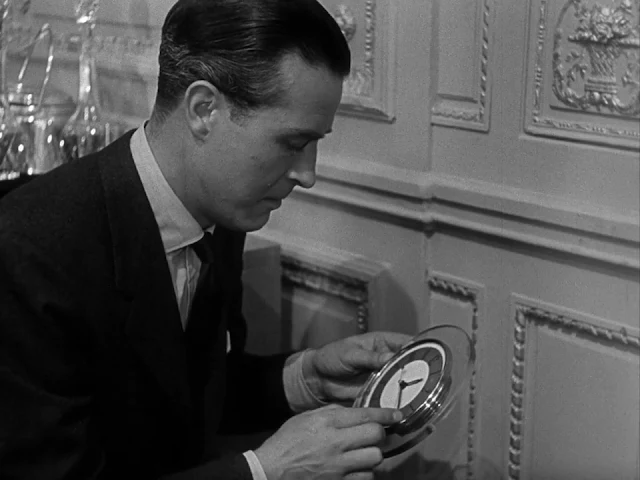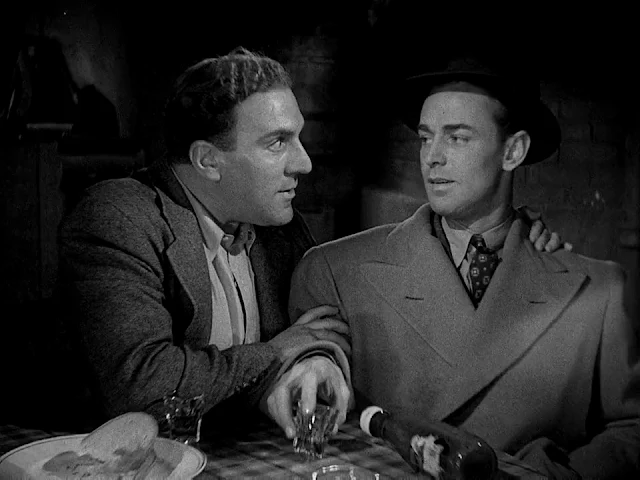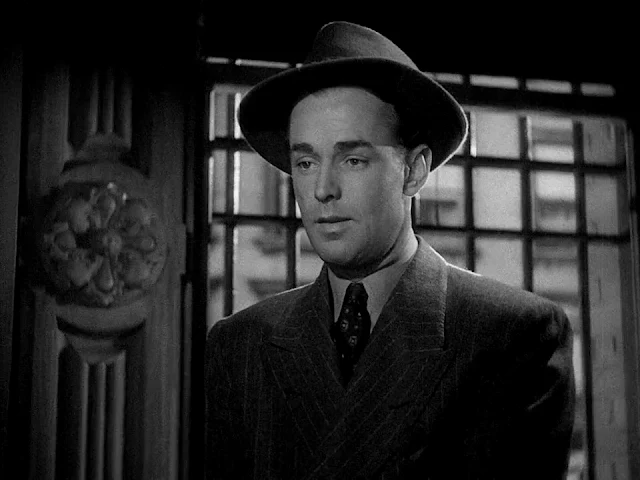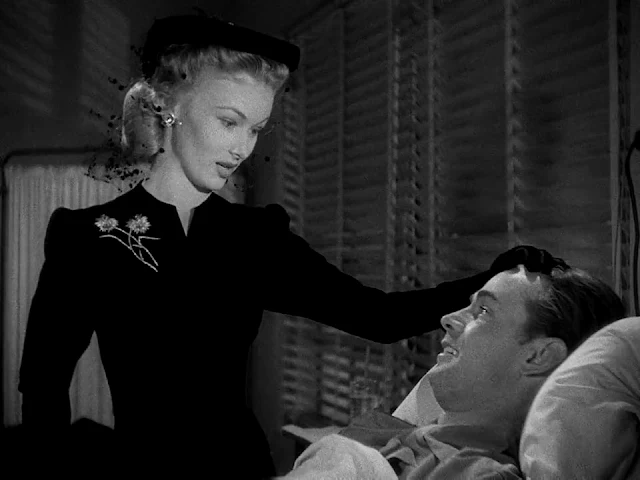 |
| Charles Laughton in Island of Lost Souls |
A blog formerly known as Bookishness / By Charles Matthews
"Dazzled by so many and such marvelous inventions, the people of Macondo ... became indignant over the living images that the prosperous merchant Bruno Crespi projected in the theater with the lion-head ticket windows, for a character who had died and was buried in one film and for whose misfortune tears had been shed would reappear alive and transformed into an Arab in the next one. The audience, who had paid two cents apiece to share the difficulties of the actors, would not tolerate that outlandish fraud and they broke up the seats. The mayor, at the urging of Bruno Crespi, explained in a proclamation that the cinema was a machine of illusions that did not merit the emotional outbursts of the audience. With that discouraging explanation many ... decided not to return to the movies, considering that they already had too many troubles of their own to weep over the acted-out misfortunes of imaginary beings."--Gabriel García Márquez, One Hundred Years of Solitude
Search This Blog
Showing posts with label Hans Dreier. Show all posts
Showing posts with label Hans Dreier. Show all posts
Thursday, December 17, 2020
Island of Lost Souls (Erle C. Kenton, 1932)
Tuesday, July 14, 2020
Duck Soup (Leo McCarey, 1933)
 |
| Harpo Marx, Chico Marx, Zeppo Marx, and Groucho Marx in Duck Soup |
The best of the Marx Brothers' movies, largely because it's nonstop nonsense. There are no breaks for a harp solo by Harpo or cute piano playing by Chico. There's no "real-life" romantic subplot like the ones Irving Thalberg inserted into the movies the Marxes made when they moved over to MGM. (This was the last movie they made at Paramount.) The songs are all excuses for goofy production numbers. This is the one with Harpo and Chico running a peanut stand and tormenting Edgar Kennedy as the lemonade seller. This is the one with the mirror routine involving Groucho and Harpo (and eventually Chico) in nightshirts and nightcaps. This is the one in which Groucho (aka Rufus T. Firefly) exhorts the troops with "Remember, you're fighting for this woman's honor, which is probably more than she ever did." (The temptation to quote is irresistible.) The woman in question is, of course, Margaret Dumont, sailing stately through the turbulent sea of Groucho's puns, insults, and double entendres. For once she has a match in enduring the brothers with aplomb: Louis Calhern takes everything they can dish out and keeps plowing ahead. Duck Soup was not particularly well-received at the time, but it has grown in favor since the sentimentality that weighed down later films like A Night at the Opera (Sam Wood, 1935) and A Day at the Races (Wood, 1937) has gone out of style. If I had to pick the funniest film ever made, and thank god I don't, it might be this one.
Sunday, April 5, 2020
The Strange Love of Martha Ivers (Lewis Milestone, 1946)
 |
| Lizabeth Scott, Barbara Stanwyck, and Van Heflin in The Strange Love of Martha Ivers |
The Strange Love of Martha Ivers doubles up on Lorenz Hart's line about "the double-crossing of a pair of heels" to give us a quartet of duplicity. There are no really good guys in the movie, though it tries to persuade us that tough guy Sam Masterson (Van Heflin) and lost girl Toni Marachek (Lizabeth Scott) are more to be admired than ruthless Martha Ivers O'Neil (Barbara Stanwyck) and her weakling alcoholic husband, Walter (Kirk Douglas). After all, teenage Martha (Janis Wilson) did kill her imperious aunt (Judith Anderson) and, with the connivance of young Walter (Mickey Kuhn) and his father (Roman Bohnen), not only cover up the murder but also frame someone else for the job. So when Sam returns to Iverstown after 18 years, Martha and Walter naturally think that he witnessed the murder and is there to blackmail them. Actually, young Sam (Darryl Hickman) beat it out the door before the aunt was conked on the head and fell downstairs, so he's ignorant -- until well into the film -- of their crime. It's not exactly clear why Sam, who makes a living by gambling, has drifted back in town, but he's not there long before he hooks up with Toni, fresh out of prison for a theft she didn't really commit, and the two of them get dragged unwittingly into the machinations of Martha and Walter. The movie was Douglas's film debut, so he receives fourth billing after Scott. He feels a little miscast as the manipulated Walter. For one thing, he was nine years younger than Stanwyck, but he also had, even then, a stronger hold on the screen than Heflin. This is, I think, a movie that doesn't have the courage of its own nastiness, trying to make us think that Sam and Toni really deserve a happy ending when it's more likely that they will eat each other alive. Trivia note: The sailor in the car with Sam when he has his accident is played by future writer-producer-director Blake Edwards.
Wednesday, November 6, 2019
The Big Clock (John Farrow, 1948)
The Big Clock (John Farrow, 1948)
Cast: Ray Milland, Charles Laughton, Maureen O'Sullivan, George Macready, Rita Johnson, Elsa Lanchester, Harold Vermilyea, Dan Tobin, Harry Morgan. Screenplay: Jonathan Latimer, based on a novel by Kenneth Fearing. Cinematography: Daniel L. Fapp, John F. Seitz. Art direction: Roland Anderson, Hans Dreier, Albert Nozaki. Film editing: LeRoy Stone. Music: Victor Young.
The Big Clock is a satisfying blend of suspense and comedy of the kind often called "Hitchcockian," which usually means it would probably have been even better if Hitchcock had directed it. But since he didn't, it's worth admiring what director John Farrow and screenwriter Jonathan Latimer did with the material provided them by Kenneth Fearing's novel. Fearing had worked at Time magazine when Henry Luce was head of that publishing empire, so it's clear that he had Luce in mind when he created the imperious Earl Janoth, played with mustache-stroking glee by Charles Laughton in the film. So there's a substratum of satire on publishing moguls like Luce -- a breed that still exists in our day, embodied by Rupert Murdoch. (And still attracts satire, viz., HBO's Succession.) The plot centers on another Hitchcockian trope, the Wrong Man. In this case, the object of suspicion is George Stroud, editor of one of Janoth's properties, a true crime magazine called Crimeways. Ray Milland plays Stroud, a hard-charging journalist who feels trapped in Janoth's empire. Eventually, through a well-set-up series of coincidences, Stroud finds himself investigating a murder in which he becomes the chief suspect, even though it was actually committed by no less than Janoth. There are domestic complications, too, involving Stroud's wife, a thankless role nicely played by Maureen O'Sullivan. The victim is Janoth's mistress, with whom Stroud has become involved because she suggests she has dirt on Janoth that Stroud can use to his advantage. The film handles all of these plot snarls with finesse, one of the rare instances in which knowing whodunit from the outset doesn't detract from the suspense. Censorship blunts some of the edges: In the novel, Stroud's marriage was less happy and his involvement with the victim more intimate. Janoth's bisexuality was also more explicit in the source -- in the film it's suggested when we see Janoth receiving a massage from his bodyguard, played silently by Harry Morgan, who remains a brooding presence in the background of other scenes. The film is enlivened by a gallery of mostly comic secondary characters, including Elsa Lanchester as a giddy artist whose works Stroud for some reason collects.
Thursday, October 3, 2019
The Glass Key (Stuart Heisler, 1942)
The Glass Key (Stuart Heisler, 1942)
Cast: Alan Ladd, Brian Donlevy, Veronica Lake, William Bendix, Bonita Granville, Joseph Calleia, Richard Denning, Frances Gifford, Donald MacBride, Margaret Hayes, Moroni Olsen, Eddie Marr, Arthur Loft, George Meader. Screenplay: Jonathan Latimer, based on a novel by Dashiell Hammett. Cinematography: Theodor Sparkuhl. Art direction: Haldane Douglas, Hans Dreier. Film editing: Archie Marshek. Music: Victor Young, Walter Scharf.
There's something a little febrile about The Glass Key, and I don't just mean the movie -- it' s inherent in Dashiell Hammett's novel, too. The movie heightens it with the casting of Veronica Lake, who always seems a little out of it in her movies, on which she often clashed with directors and/or stars. And William Bendix's sadistic thug has a special menace for those of us who remember him in his familiar sitcom role, as the working-class schlub in The Life of Riley. It was a breakthrough role for Alan Ladd as the semi-conscientious right-hand man to Brian Donlevy's shady politician. Ladd gets beaten into the hospital by Bendix, where he spends a lot of time doing what he does best: flirting, in this case with the nurse. He also flirts with Lake, as the daughter of Donlevy's political rival turned ally, as well as with Bonita Granville, as Donlevy's sister, and even the wife of the corrupt newspaper publisher who wants to frame Donlevy for murder. And so on, in a reasonably faithful translation of Hammett's book that only misses the author's dryly tough prose style.
Tuesday, September 10, 2019
I Married a Witch (René Clair, 1942)
Cast: Fredric March, Veronica Lake, Robert Benchley, Cecil Kellaway, Susan Hayward, Elizabeth Patterson, Robert Warwick. Screenplay: Robert Pirosh, Marc Connelly, based on a novel by Thorne Smith and Norman Matson. Cinematography: Ted Tetzlaff. Art direction: Hans Dreier, Ernst Fegté. Film editing: Eda Warren. Music: Roy Webb.
This somewhat over-frantic supernatural romantic comedy was the product of much friction during its preparation and filming, and it shows. At various points, Preston Sturges (as producer), Dalton Trumbo (as screenwriter), and Joel McCrea (as the male lead) were involved with it and left because of conflicts with director René Clair and actress Veronica Lake (who also fought with Fredric March after he took over the lead from McCrea, who had hated working with her a year earlier on Sturges's Sullivan's Travels). The premise is that two witches, Jennifer (Lake) and her father, Daniel (Cecil Kellaway), burned at the stake in 17th century Salem, have returned from the dead to haunt the descendant of the man who had them burned. He happens to be a gubernatorial candidate in Massachusetts, Wallace Wooley (March), who is also on the verge of marrying a shrewish snob played by Susan Hayward. Daniel casts a spell to give Jennifer a mortal form, whereupon she puts an end to the wedding but also falls in love with Wallace. Complications ensue in a brittle and occasionally rather cruel comedy in which no one either in front of or behind the camera seems to be working at top form.
Wednesday, July 24, 2019
The Miracle of Morgan's Creek (Preston Sturges, 1943)
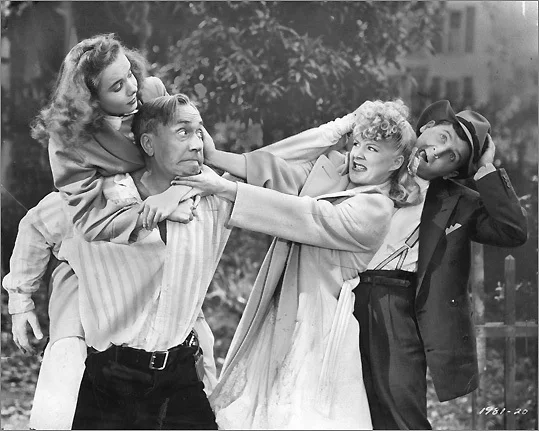 |
| Diana Lynn, William Demarest, Betty Hutton, and Eddie Bracken in The Miracle of Morgan's Creek |
The Miracle of Morgan's Creek is one of the funniest films ever made, but it's my least favorite Preston Sturges movie. That's because it leans more heavily on wackiness than on wit. I have to admire how skillfully Sturges managed to hoodwink the censors -- could anyone else have managed to name a character, let alone one who mysteriously gets pregnant, Trudy Kockenlocker? The sheer audacity and the skill of the story's construction are breathtaking. But it's just a little too loud for my taste, which is partly the fault of casting Betty Hutton. Sturges was a director who could get astonishingly funny performances out of serious actresses like Barbara Stanwyck and Claudette Colbert, but casting the uninhibited Hutton as Trudy seems to kick the film up a notch too high. Still, the movie has one of my boyhood crushes, Diana Lynn, to bring a sly note to her role as Trudy's wisecracking kid sister, and every moment William Demarest is on the screen, steam coming out of his ears, is welcome.
Saturday, April 27, 2019
Design for Living (Ernst Lubitsch, 1933)
Design for Living (Ernst Lubitsch, 1933)
Cast: Fredric March, Gary Cooper, Miriam Hopkins, Edward Everett Horton, Franklin Pangborn, Isabel Jewell, Jane Darwell, Wyndham Standing. Screenplay: Ben Hecht, based on a play by Noël Coward. Cinematography: Victor Milner. Art direction: Hans Dreier. Film editing: Frances Marsh. Music: John Leipold.
Friday, April 19, 2019
A Farewell to Arms (Frank Borzage, 1932)
A Farewell to Arms (Frank Borzage, 1932)
Cast: Gary Cooper, Helen Hayes, Adolphe Menjou, Mary Philips, Jack La Rue, Blanche Federici, Mary Forbes, Gilbert Emery. Screenplay: Benjamin Glazer, Oliver H.P. Garrett, based on a novel by Ernest Hemingway. Cinematography: Charles Lang. Art direction: Roland Anderson, Hans Dreier. Film editing: Otho Lovering, George Nichols Jr.
Subscribe to:
Comments (Atom)














